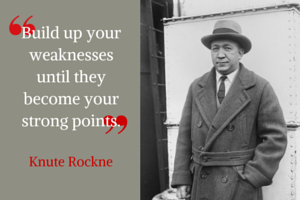Knute Rockne and Making the Effort to Inspire Greatness
By ASLAN Training
November 2, 2015
4 min read

The ASLAN Other-Centered® Leader
Coaches Quiz Blog Series
Every winner has a coach, and every coach has a philosophy. The ASLAN Other-Centered® Leader Coaches Quiz matches your coaching style with some of the legendary coaches in sports. Here is a deeper look inside the philosophy of one of the best.
Before Knute Rockne became a football coach, he was a top student athlete. He also had a stuttering problem.
Rather than let his speech get in the way of what he wanted to do, he took courses on public speaking and worked hard to overcome his speech impediment. As a result, Rockne is known as one of the most motivational and inspiring college football coaches in history. His Notre Dame team had five undefeated seasons and won many national championships.
Rockne knew that in order to do their best, his players needed to be inspired and motivated. He knew that training and skills were an important part of the package, but players had to have a reason and a purpose for putting those skills into practice. They had to know that their coach believed in them, and he used his inspirational speeches to not only remind them how to use their skills, but let them know that he believed they could do it.
As a sales coach, it is important to communicate to your team both the skills needed to succeed and the reasons for doing so. Rather than criticizing a poor performance, you can use your words to inspire and build up your team so that they will want to do well and earn your praise.
Rockne knew that a short speech was far better than a long monologue. He chose his words carefully and knew how to tell stories that left his audience wanting to hear more rather than wondering when it would be over. Your sales team isn't likely to be motivated by a long speech that takes time away from doing their jobs, but a few well-chosen words may just have the power to inspire them to new heights in sales performance.
This excerpt from ASLAN Training's whitepaper, "The Six Pitfalls of a Sales Training Initiative," explains how focusing on just one area at a time can help a sales rep find success:
Pitfall #5: Throwing in Everything But the "Kitchen Sink"
When making the huge investment to bring the sales force together for a training event, the temptation is great to cram everything into one program and to apply the training to every possible product, solution, and service. Don't fall for that temptation. Self-efficacy (one's belief in their ability to reach a goal) is a critical component to learning. When you overwhelm participants with too much information, they quickly make the decision that while change may be beneficial, it's just not possible. The key to training is not to raise the bar but to lower it, ensuring reps quickly develop momentum in a new direction.
Here are a couple of recommendations to help ensure you calibrate the correct amount of content to your audience.
- Apply training to just one solution, product set, or customer type. For example, avoid building your discovery models and exercises around uncovering the needs for every solution. Instead apply to just one specific solution. This is not the time to educate the reps on all the solutions your organization offers. The focus is to develop the skill. If you try to accomplish both, you will accomplish neither. Build the skill models around one solution throughout the program. If they develop the new skill by applying to just one solution, they will quickly see and be able to apply it to their remaining solutions.
- Measure the percentage of time spent in interactive exercises. If application of the concepts taught in the program is under 50%, you have too much content. The actual percentage should be determined by the availability of the managers to reinforce the program. The less management support offered, the higher the percentage should be spent on application. The more you can lean on the managers to coach and develop their team, the less dependent you are on the training event to develop new skills. Regardless, the time spent on application should never drop below 50%.
Download the entire whitepaper to find out more about how to conduct a successful sales training initiative.
By focusing on inspiring and motivating his team, Knute Rockne amassed a lifetime coaching record of 105 wins and only 12 losses and 5 ties over 13 seasons. When you focus on inspiring your sales team to use the skills they are learning, you can bring out the best in your team as well.
If you'd like to read more about each of the coaches in our Other-Centered Leaders Coaches Quiz Series, click here. Or, if you haven't already done so, take our quiz and see which coach your leadership style is most like.
Unlock Your Team's Full Sales Potential
Questions? Watch our CEO, Tom Stanfill, address our frequently asked questions below.


